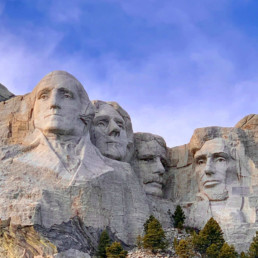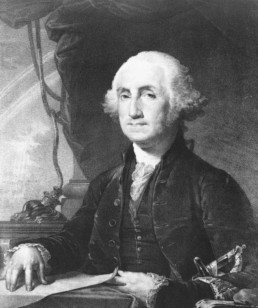Origins of this celebrated national holiday
History of Presidents' Day
Originally established in 1885 in recognition of President George Washington, the holiday became popularly known as Presidents’ Day after it was moved as part of 1971’s Uniform Monday Holiday Act, an attempt to create more three-day weekends for the nation’s workers. While several states still have individual holidays honoring the birthdays of Washington, Abraham Lincoln and other figures, Presidents’ Day, while not officially named that way, is now popularly viewed as a day to celebrate all U.S. presidents, past and present.
To learn more and for classroom resources:

Washington's Birthday
It all starts with George!
The story of the Presidents Day date begins in 1800. Following the death of George Washington in 1799, his February 22 birthday became a perennial day of remembrance.
At the time, Washington was celebrated as the most important figure in American history, and events like the 1832 centennial of his birth and the start of construction of the Washington Monument in 1848 were cause for national celebration.
While Washington’s Birthday was an unofficial observance for most of the 1800s, it was not until the late 1870s that it became a federal holiday. Senator Stephen Wallace Dorsey of Arkansas was the first to propose the measure, and in 1879 President Rutherford B. Hayes signed it into law.
The holiday initially only applied to the District of Columbia, but in 1885 it was expanded to the whole country. At the time, Washington’s Birthday joined four other nationally recognized federal bank holidays — Christmas Day, New Year’s Day, the Fourth of July, and Thanksgiving—and was the first to celebrate the life of an individual American. Martin Luther King Jr. Day, signed into law in 1983, was the second.
McClory was among the measure’s major proponents, and he even floated the idea of renaming the holiday Presidents Day. This proved to be a point of contention for lawmakers from George Washington’s home state of Virginia, and the proposal was eventually dropped.
Nevertheless, the main piece of the Uniform Monday Holiday Act passed in 1968 and officially took effect in 1971 following an executive order from President Richard M. Nixon. Washington’s Birthday was then shifted from the fixed date of February 22 to the third Monday of February. Columbus Day, Memorial Day, and Veterans Day were also moved from their traditionally designated dates. (As a result of widespread criticism, in 1980 Veterans Day was returned to its original November 11 date.)

George Washington
See other activities and lesson plans available here:

Invite a Speaker
Let your students learn directly from a veteran or first responder and hear first-hand what it’s like to serve our country. Invite one of our distinguished national heroes to talk to your class or group via Zoom or an in-person visit to your school or club.

Honor a Hero with a Tribute
The mission of Carry The Load is to honor and remember all those who have served and sacrificed for our country. We rely on people like you to tell the stories of your heroes and carry their name forward. Submit a tribute to honor your loved one today.

Shop & Give Back
Help support our work and fund the resources we provide by purchasing items from our shop. Wear our Carry The Flag collection with pride to show your patriotism and support our non-profit and the many ways we assist veterans and first responders.
Did you know?
Presidents Day never falls on the actual birthday of any American president. Four chief executives—George Washington, William Henry Harrison, Abraham Lincoln and Ronald Reagan—were born in February, but their birthdays all come either too early or late to coincide with Presidents Day, which is always celebrated on the third Monday of the month.
Keep in Touch!
Get notified whenever we publish new materials and receive alerts of resources for upcoming patriotic holidays and events.

